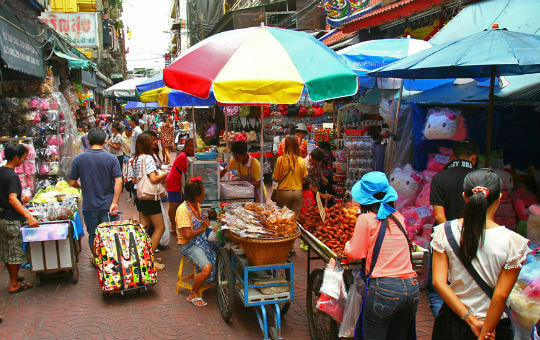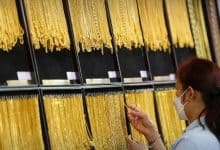Thailand’s business community urges govt for festive financial jolt

As the new year approaches, Thailand’s business community is pulling no punches in calling for urgent government intervention to jump-start the economy. With suggestions ranging from tax breaks to debt relief, industry leaders are clamouring for robust stimulus measures to invigorate growth.
Nath Vongphanich, President of the Thai Retailers Association, is at the forefront of this push, advocating for a ramp-up in public investment as a springboard for economic expansion in 2025.
“We need the government to accelerate budget disbursement and public spending to meet economic targets. There is a need for a broad distribution of funds through investment, procurement, and other stimulus strategies to propel Thailand forward.”
Nath zeroed in on small and medium-sized enterprises (SMEs) as needing a boost, particularly against the backdrop of cheap imports from China. He proposed measures such as low-interest loans, expanded trade opportunities, and widened marketing channels for Thai products.
“Next year, the Thai Retailers Association will launch the TRA GREAT initiative. This will offer spaces in member retailers like Makro, Lotus’s, and Central for micro-SMEs to market their products year-round.”
The association is also pushing for consumer spending boosts through programmes like Shop Dee Mee Khuen, Easy e-Receipt, and other private sector investment incentives.

Additionally, Nath suggested tax incentives for tourists, possibly mirroring Japan’s tax-free shopping scheme to spark spending.
“In Thailand, this could start with VAT exemptions for purchases exceeding 5,000 baht per day at a single store.”
Over at the Thai Chamber of Commerce, Chairman Sanan Angubolkul has released a white paper brimming with economic stimulus proposals.
“The government should focus on reducing living costs for individuals and operational expenses for businesses. They should also have price controls on essential goods and services, freezing electricity and diesel prices, and establishing an energy board.”
Sanan also suggested a revamp of the minimum wage by a tripartite committee and voiced concerns that a planned 10,000-baht handout might fall short of required economic stimulation.
A proposed multiplier measure could potentially double economic fund circulation, with the Easy e-Receipt programme possibly injecting 30-50 billion baht into the economy without additional state budget outlays.
Interest rate deductions
Debt reduction is also high on the agenda, with the chamber advocating for integrated monetary and fiscal policies to tackle inequality.
Suggested measures include debt moratoriums and extensions for housing, vehicles, and SMEs, particularly for essential work-related vehicles. Sanan emphasised the need for swift interest rate reductions and improved credit access.
“The government should ensure fair trade practices to enhance the competitiveness of Thai businesses against imports.”
Sanan also urged both domestic and foreign investment attraction. Designating Prachin Buri as part of the Eastern Economic Corridor, he suggested, could significantly boost regional industry competitiveness, particularly in food, tourism, wellness, and logistics.
With Thailand’s peak tourism season looming, opportunities abound to leverage major festivals like New Year’s Eve, Chinese New Year, and Songkran to attract tourists, said Sanan.
“Promoting Thailand’s soft power through events and ensuring Thai festivals gain global recognition could attract high-potential tourists, generating substantial economic income.”

KGI Securities (Thailand) Senior Vice-President Rakpong Chaisuparakul expects the government to unveil a consumption package as a new year’s gift.
“We anticipate the new year package may include a 38-billion-baht cash handout for farmers, 40 billion baht for the elderly, and an Easy e-Receipt programme effective in the first quarter.”
Key market players eagerly await details of the Bank of Thailand’s household debt relief plans. KGI estimates these will encompass 2.3 million loan accounts, worth 1.3 billion baht, focusing on housing and consumer loans.
The proposed assistance package would span a three-year period, permitting debtors to waive interest rates and pay reduced monthly instalments.
As the economy gears up for a potential boost, stakeholders across the financial spectrum are positioning themselves for the journey ahead. Surapong Paisitpatanapong, Vice-Vhairman of the Federation of Thai Industries, commented on a proposed car trade-in programme to stir up auto sales.
He acknowledged its potential benefits but expressed concerns about its implementation.
“The government must address banks’ stringent auto loan criteria amid rising household debt.”
Wallop Treererkngam, Executive Vice-President of Suzuki Motor (Thailand), agreed, advocating for measures addressing household debt to facilitate auto loan approvals. Meanwhile, Chaiyaporn Nompitakcharoen of Bualuang Securities called for government backing in green initiatives like solar rooftops for SMEs, seeing them as future economic bedrocks.
Finally, Somchai Sittichaisrichart of SIS Distribution Plc suggested tax exemptions for companies investing in solar and IT systems for a sustainable business shift. Proposing a VAT increase from 7% to 10% could enhance state revenue, aligning with regional norms.
Frequently Asked Questions
Here are some common questions asked about this news.
Why is public investment considered a key catalyst for Thailand’s economic growth?
Public investment can drive infrastructure development, stimulate employment, and increase consumer spending, creating a ripple effect boosting overall economic growth.
How could Thailand’s proposed tax incentives for tourists impact the economy?
Tax incentives could attract more tourists, increase spending in local businesses, and enhance Thailand’s appeal as a shopping destination, thereby boosting economic activity.
What if Thailand’s government does not address the influx of inexpensive Chinese goods?
Local SMEs might struggle to compete, potentially leading to business closures, job losses, and decreased domestic economic resilience.
How might reducing household debt influence Thailand’s economic stability?
Lower household debt can increase disposable income, leading to higher consumer spending and economic growth, while reducing financial stress among citizens.
Why is promoting Thailand’s soft power through festivals seen as a strategic economic move?
Highlighting Thai culture can attract international tourists, boost tourism revenue, and enhance Thailand’s global cultural influence, contributing to economic development.
Latest Thailand News
Follow The Thaiger on Google News:


























